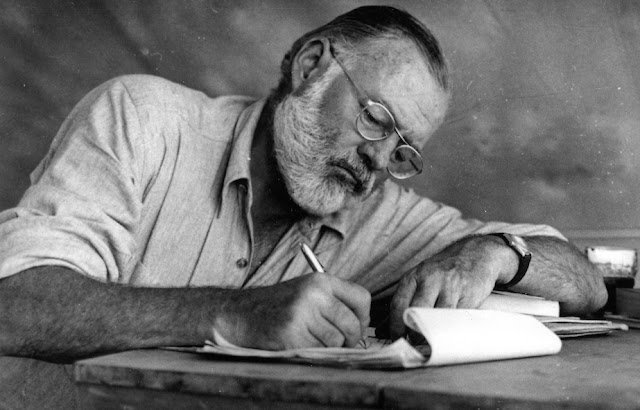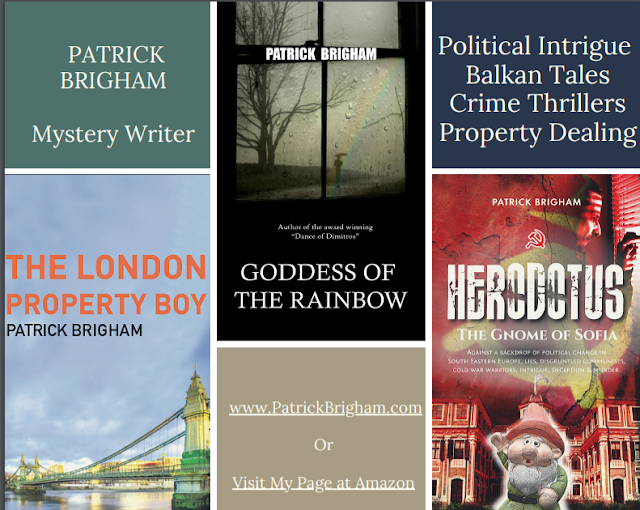When you consider the number of books any one writer can publish during their lifetime, it is hard to accept that level of disdain, especially from those who seem to have little value for art or literature, and are only interested in its price tag. Because, to be a writer, is to expect very little, - other than occasional recognition - a modest income, and frequent misinterpretation. Should you choose to be a writer, unless you are John Le Carre or J.K.Rowling, you had better get used to the idea that your life will be one long struggle, unless you are very fortunate indeed.
When I wake up in the morning, I sometimes lay in bed for half an hour or so, to decide what I am going to write. In a kind of subconscious state, my mind seems to be able to conjure up all sorts of incidents and ideas, which can fit into a story that I am writing, or a magazine article I will publish. This routine somehow puts so called writer’s block into limbo, the choice between journalism or a book being a very good elixir; the practical versus the improbable. But, that’s just the beginning.
These days, unless one is financially independent, one cannot lock oneself away in a garret, and just write. It sounds good, but now we are going back to thoughts of self indulgence. The reality is different, because - like it or not - people do not just buy books these days, they follow genres.
There are more books on the internet written by so called experts, telling you what and how to write, and more rules on how to describe your writing, than you can shake a stick at. Maybe we should all write a ‘How To Write’ book or two, it might fill the coffers more easily. But the simple truth is, no matter how we might dislike the idea, Amazon has taken over our lives, and tells us what and how to write. So, when I sit at my desktop computer of a morning, I am no longer in control of my story line, the characters I portray, nor my vocabulary, because, I now have to write with the consumer in mind, and of course, those ever necessary reviewers.
Most recently, concerning my current murder mystery, a reviewer stated that I used archaic or out of date English. Another confused me with a different writer altogether – whose protagonist rushes around hitting and shooting people – saying that my book was slow and unreadable. Placed within a catalogue of five star reviews, I wasn’t sure if these remarks either reflected me, or even the critic themselves. But, in the end, it was clearly Amazon who was at fault, and one more example of their tinkering with the world of literature. You see, for some reason they put this other writer on the same page as all my books, for their own commercial reasons, and they have no intention of altering their marketing strategy for me. I know, they said so!
In my most recent novel, I have steered away from murder mystery, and following a thread from Chekov, I have decided to write about the rain, and how it alters our lives, especially when it leads to flooding. People act differently in these circumstances, as many Americans well know from the recent Texas tragedy.
But my story is about Greece, where I now live, and the Greeks - their mores and prejudices - their values, and often their loneliness. The rain can change all that, but how can I explain this to Amazon. In fact, how would Anton Chekov have explained his writing to an Amazon audience, had he been alive today? But then again, he is so famous his name alone would be enough.
I suppose it is coffee which keeps me going. The sun may shine all day for me in Greece, and I have to find good reason to stay indoors and write. So I have become addicted to this awakening and essential brew, which keeps my mind alert, my imagination in full flight, and somehow stops all the clocks in the house. Even so, the world still goes on outside, debts have to be paid, friendships nurtured, and conversations need to occur where we speak of nothing in particular, and everything in general. This is called life, I suppose?
I get up from my desk, and look through the window. It is late Summer, and the pollen is choking the villagers. They sneeze and stumble past in the heat, to get their days' supplies from the air conditioned supermarket. As I watch them pass my house, I wonder why it is I write at all, considering what I have just written? But I know the answer. It is the answer we all give, the one which causes so much embarrassment and confusion, when we are casually asked why we write.
”I just have to write. If I don’t I become edgy and neurotic; anyway, I have to finish this story, I can’t just leave it, it won’t write itself!”
But in actual fact, it often does write itself. It is as though someones hand is guiding our fingers, as they rattle away on the computer keyboard, or the pen, as it scrawls across a school notebook. Perhaps it is Micky Spillane calling , or even Anton Chekov - who knows?










